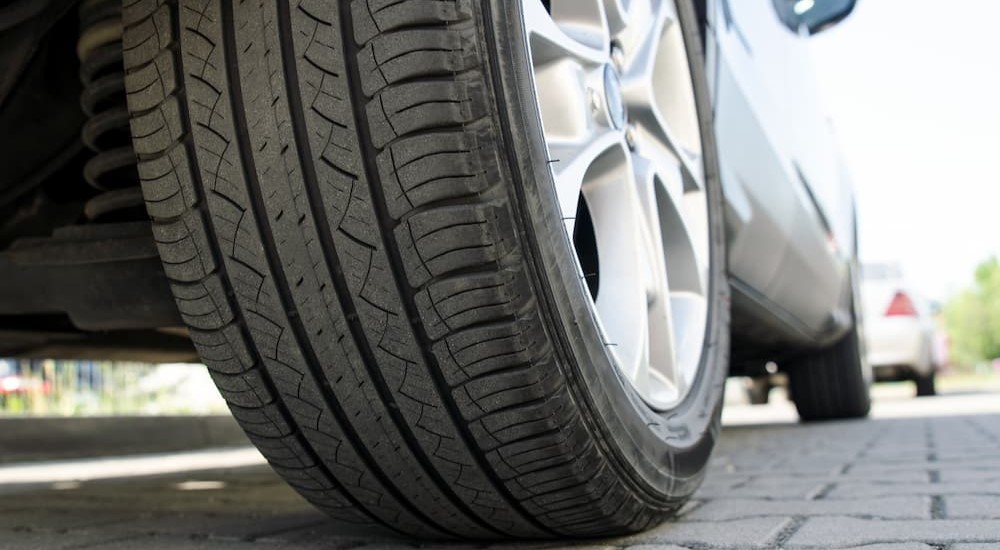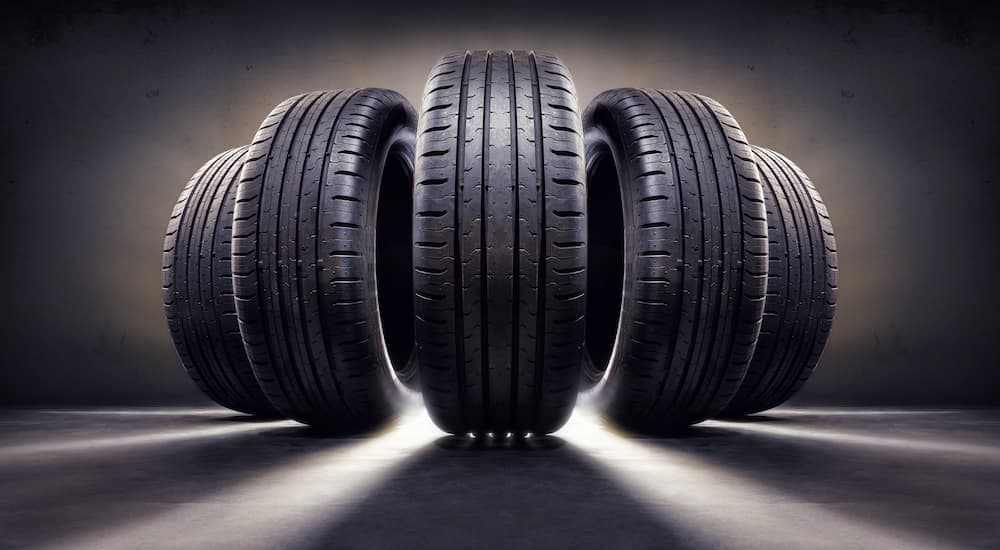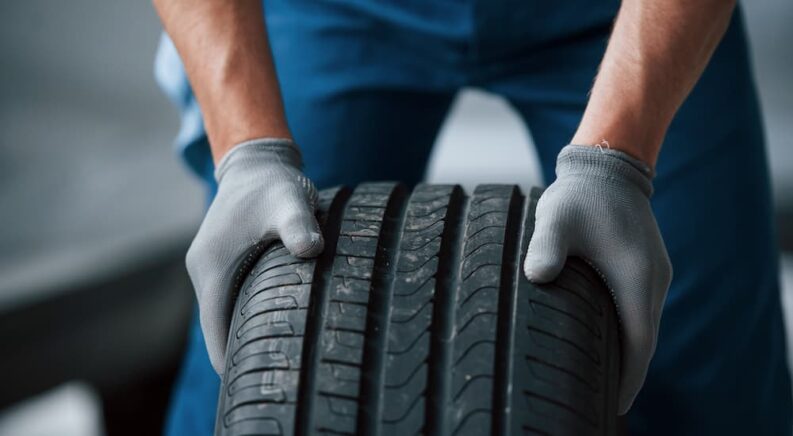A dedicated set of summer tires can have a noticeable effect on overall vehicle performance, control, and comfort. Summer tires—also commonly known as performance tires—might not be as versatile as the all-season tires typically found on most vehicles, but if you’re looking to unlock the potential of your sports car, performance vehicle, or EV, they’ll make a big difference. The question is, how do summer tires compare with all-season tires regarding some common tire-related metrics?
If you’ve considered looking for a new set of Toyota summer tires for sale, you’ve probably asked yourself this very question. Drivers flock to summer tires for their performance benefits but often forget to consider many of the other advantages—and disadvantages—that these tires provide. From value and fuel economy to noise, acceleration, and more, we’ve compiled a handy guide that should come in handy for those who are weighing summer tires against their all-season counterparts.

Value
Advantage: All-Season
If you’re looking to save a little money, all-season tires are the way to go. Not only are they typically more affordable than summer or performance tires, but they’ll also last you a lot longer. The average tread life of a summer tire is around 25,000 miles, while all-season tires more than double that figure with an average tread life that hovers around 60,000 miles. Then there’s the matter of installation.
If you’re handy with a jack and lug wrench, it’s easy enough to offset this cost with a little DIY handiwork—but for the rest of us, changing out tires for a new season typically involves a trip to our local dealership or tire shop. Getting all four tires changed over will usually run a driver about $60 to $80 between the mounting, unmounting, balancing, and reinstallation.
All-season tires allow drivers to avoid these costs, making them the ideal choice for the budget-conscious (though they should still get their wheels and tires regularly aligned and balanced). If you’re itching to try out some summer tires but want to temper the cost of seasonal installation, consider investing in a dedicated set of rims, as most shops will only charge you between $30 and $40 to swap them out.
Acceleration & Braking
Advantage: Summer
In the most basic terms, all-season tires are focused on tread life and minimizing the effects of inclement weather, whereas summer tires are all about performance and maximizing contact with the road. The tread patterns of summer tires are more shallow and straight than those found on other types of tires, and they feature long, continuous ribs that simply put more rubber on the road than other types of tires. The more a tire presses against the road, the more energy transfers through friction to create the “grab and pull” of propulsion, allowing drivers to feel every iota of horsepower when they put the pedal to the floor.
These same elements also have a noticeable impact on braking, with summer tires offering much shorter stopping distances than all-season tires. Again, other factors like tire width, aspect ratio, rim diameter, quality, and more all affect acceleration and braking. Still, if you’re comparing all-season and summer tires on acceleration and braking performance alone, it’s no contest.
Of course, this is only true when you’re using summer tires in their intended environment, which is to say, summer. When the thermometer starts to drop, summer tires’ performance can go right off a cliff as the rubber compounds begin to harden, increasing stopping distance and taking a toll on control, traction, and feel.
Fuel Economy
Advantage: Split
When you’re researching tires, you might encounter the term “rolling resistance.” While it might sound technical, it’s really just a way of expressing how much friction a specific tire has when it rolls down the road. Less rolling resistance means less grip, but it also means improved fuel economy, as the engine doesn’t have to work quite as hard to get the tires rolling.
Unfortunately, it’s hard to give a definitive verdict when it comes to fuel economy, as all-season and summer tires tend to match up pretty well. It really depends on the specific tire—but generally speaking, summer tires tend to use softer rubber compounds, whereas all-season tires feature larger and deeper tread blocks. Both of these attributes contribute to increased rolling resistance, so it’s hard to separate all-season and summer tires on this basis alone.
Wintertime
Advantage: All-Season
While they’re not quite at the level of winter tires, all-season tires are still a much better choice than summer tires when winter weather creeps in. All-season tires are designed to excel in a variety of conditions, from dry, dusty summer days to wet, snowy winter nights.
Many factors contribute to an all-season tire’s ability to handle inclement weather, from small grooves called sipes cut into the tread to deeper grooves and even the design of the tread pattern itself. All-season tires tend to use a symmetrical tread pattern as opposed to the directional tread pattern found on most summer tires.
The symmetrical tread offers a number of advantages for the average driver: longer tread life, better performance in both wet and dry road conditions, and perhaps most importantly, longevity. The symmetrical design allows all-season tires to be easily rotated between all four corners of a vehicle, too, ensuring even tread wear and extending the life of your tires.
Cornering
Advantage: Summer
Summer tires are also known as “performance” tires for a reason: they excel in allowing drivers to unlock the potential of their sports cars, EVs, or other performance-oriented vehicles. If you’re looking to live out your F1 dreams, summer tires are the obvious choice, giving drivers a level of control that can go a long way in improving not only performance and fun but also safety.
Summer tires offer better cornering than all-season offerings due in part to the construction of their sidewalls. By using a low-profile design, manufacturers can reduce the amount of flex that occurs in a tire, which has a big impact on cornering as it improves control and the overall feel of handling while allowing the tires to remain firmly flush with the ground.
Wet Conditions
Advantage: Summer
Many drivers assume that since all-season tires outperform summer tires in winter driving conditions, the same is true when it comes to rain—but that’s a fairly common misconception. While the deeper tread and larger blocks of all-season tires mean they’re great at crunching through snow, plain old rainwater is another story altogether.
The rubber compounds used in summer tires are designed to offer outstanding grip on wet surfaces, which is an important consideration when you’re in the driver’s seat of a performance vehicle. Many summer tires are also designed with a unique tread pattern aimed at dispelling moisture as quickly as possible, allowing drivers to avoid the worst-case scenario: hydroplaning.

Noise
Advantage: Split
Much like fuel economy, it’s hard to make any generalizations about tire noise when comparing all-season and summer tires. Again, it really depends on tread construction and quality, with tread size, depth, and the softness of the rubber compound all contributing to how much of a racket the tires will make. The same can’t be said for winter tires—especially the studded variety—which tend to create a noticeable drone as they cruise down the road.
Some manufacturers are known for their quiet tires, while others seem to make it less of a priority, so make sure you do your research if you’re looking to run as quietly as possible. Tire noise might not contribute to performance but can be a make-or-break factor for some drivers. This is particularly true when it comes to electric vehicles, which—given the lack of engine noise—make it all too easy to notice the noise emanating from your wheel wells.
Where the Rubber Meets the Road
If you’re the type of driver who values tight cornering, wet weather performance, and rapid acceleration and braking above all else, summer tires might be worth a closer look. They might lack the longevity and adaptability of all-season tires, but if you’re looking to give your performance or sports car every possible advantage, it’s hard to ignore the appeal of a good set of summer tires.
That said, these might not be the right choice for everyone. If you live in an area that experiences painfully short summers, these tires aren’t the most practical option, as they’re not made to operate in colder temperatures. Value is another important consideration, with summer tires wearing out well before most all-season options.
Every driver will have their own set of priorities when it comes to their vehicle, but we hope this guide has done its part in highlighting the differences between the two main types of tire designs.

